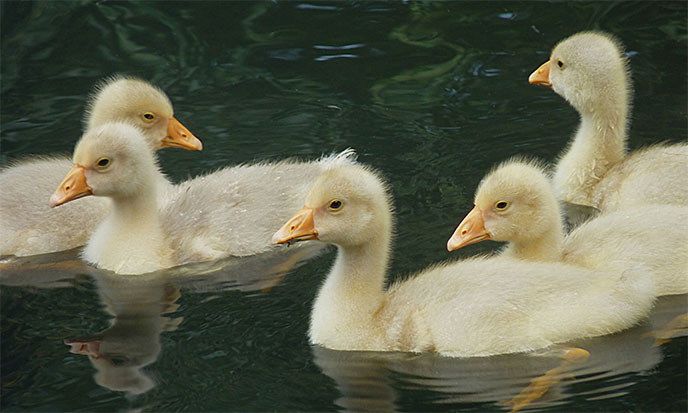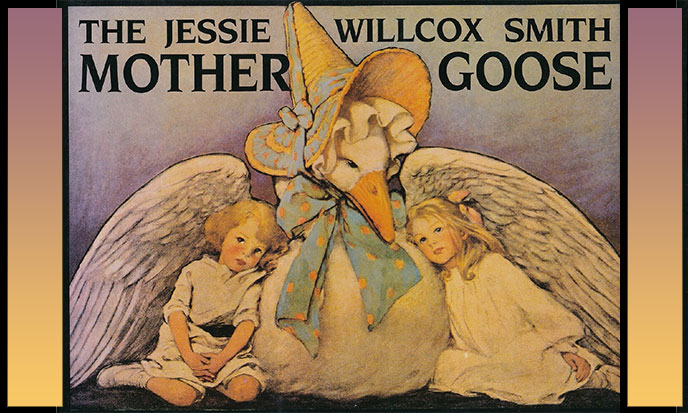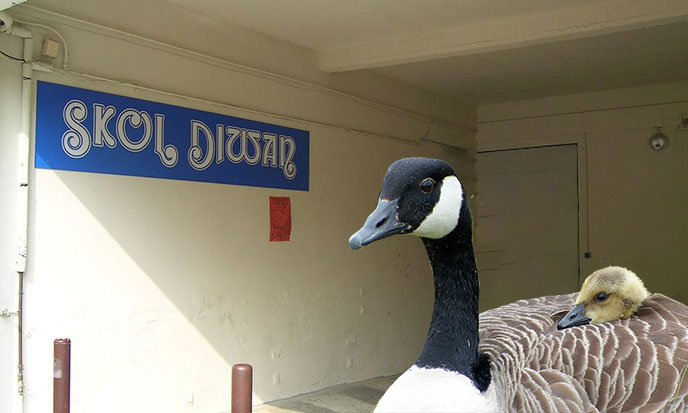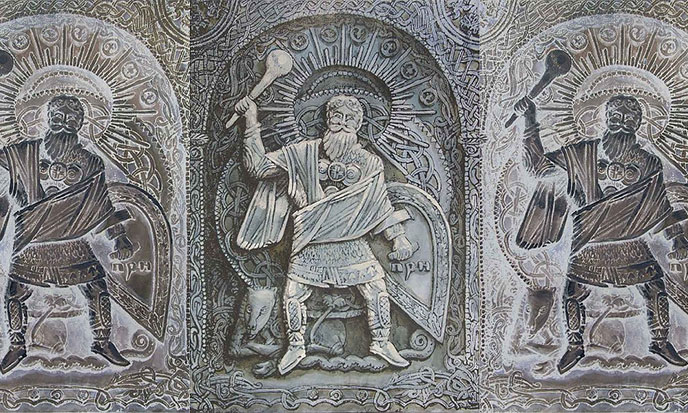
The language of the birds, that is the pleasant name we give to the clear hearing or third ear. We can ask what birds have to do with it. We’ll see soon, it’s related to the total code. Say yes, to start. Yes metalanguage is everywhere – yes, synchronicities abound – yes, we recognize our like at first glance – yes, the hidden senses becomes more and more visible – yes, yes, yes, it’s so good to say yes …
In old literati French, they said oïl, which evolved oui – and in old street or fields French, it was said oi, who gave ouais. Are the grandchildren of Mother Goose the only ones to know? In order to designate a language understood only by the initiated, we say: the language of the birds. It is the mysterious language used in the Middle Ages by the cathedral builders. But this formula is not exact. We should say: the language of the goslings. In French, oiseauxbirds is very close to oisonsgoslings.
The difference is significant. Why goose? In coded language, the companions who built the cathedrals were called Mother Goose’s children, which also means, in the language of goslings, products of the bitter law.
The language of goslings is keen of word games, puns, gauloiseries and so on, for the sacred also feeds on it.
The medieval builders had other reasons for calling themselves little ones of the Goose, in particular the Pédauque, or palm of the goose, as we saw in The Mother Goose. Let us return to our goslings and their beautiful language, which is also called slang. Yet there are so many different slangs in France alone! Language of goslings is a living language, while the academic language is a dead language.

For the convenience of the reader, I will return to the usual formula, language of the birds, since the use has dedicated it. There are as many birds languages as living languages. The local dialects also know – and very well! – that language which makes people laugh at the same time it makes them understand.
Everything is codified by popular wisdom, which is based on the daily experience of a crowd of people, of hundreds, thousands of true incidents, of experience forged through the hard blows of life, the emotional accidents, the trauma of childhood, and the harshness of the ordinary struggle we have to fight each day, each of us.
As soon as we start word games, words pay us back. Every word, every ordinary expression is full of meaning — which is forgotten, to which one no longer takes notice, because everything fades out.
That is why you know a country only by speaking its dialect, a neighborhood by speaking its slang, a company by speaking its jargon. That’s why we recognize the metalanguage we use. Every language is a code: in addition to a means of understanding oneself, it is also a means of not being understood by intruders.
This is how the dialects or patois all have their local version, which can be very different from one village to another. This explains why old Bretons do not always understand the Diwan Breton when spoken, because vocabulary and pronunciation differ markedly from one hamlet to another.

The language of the birds is not dead, it can not die. It is found in all languages, it is an indispensable variant, it allows groups and subgroups to exchange freely and with great precision and fosters the development of the group and its members.
Today we speak a language full of surprises, which owes much more to puns than to university linguistics. I was exchanging ideas with a friend, researcher also, Alain Aillet. We were discussing the first settlements of the terraforming gods on our planet, when it was still wild. We agreed on the Ural Mountains – until then, no language of goslings. Patience, it’s coming.
The first humans knew nothing, they lived like animals. The terraformers have chosen some of them to be trained on Hyperborea, their gigantic mother-ship in stationary orbit over the north pole. Where was the very first astroport where these chosen humans were to embark for Hyperborea? Alain answered me tacitly: on Mount Tabor.
Before my surprise, he assumed an air of understanding: “Mont Thabor = Monte à bordGet on board; French pronociation is strictly the same” I found it enormous, and yet! Searches made, Mount Thabor is eligible as an ancient astroport, and Alain Aillet might well be right once again.
Here it is, the language of goslings!! And this is inexplicable. A play on words in modern French describes precisely an ancient reality, dating from a time when the French language did not exist. Better still: what works in French works similarly in all languages. This is the most beautiful point.
Logic would want none of that to work. But it works allright – and in any case !? Can we imagine that the terraformers have planned this for a long time? They were the ones who composed the myths, as I have shown. Could it be that they have conceived all our languages themselves, with the greatest care? By inserting keys, infinite tricks, so that the truth can emerge, even for a child, many millennia after their passage?
It is hard to believe … Yet they have made us, as a species, from precise genetic material, to achieve an expected result. These pros of the terraforming were gods, do not forget it. Gods, you get it ? They know how to do it, stuff and things.
So they scattered all the languages of potential word games, seeds of word games in short, which it is up to us to germinate.
A series of modern word games are revealing of distant secrets. A good example has been given on this site: Perun, Slavic god of lightning. In the Slavonic language, Perun Aska is pronounced like Peru Nazca, at the other end of the world. The case has been studied elsewhere, I will not return to it.

By multiplying the examples, we find each time the same subject of astonishment. So ? Let’s play with words, play with sounds, the language of the origins can be found in all our modern languages. If one takes the trouble to consider only sound, incredible similarities appear in languages as apparently remote as Slavonic and Peruvian, French and Chinese, a Japanese dialect and Eskimo and Basque, to mention only these cases.
And it will take one of these four to suppress the different scriptures and characters, to adopt a universal phonetic transcription. Then we will see all the similarities that exist between seemingly unrelated languages. That day will begin the real quest for the language of the origins.


